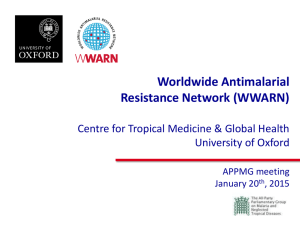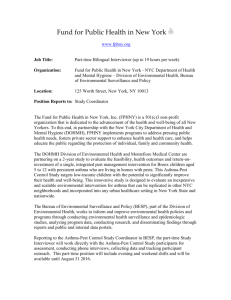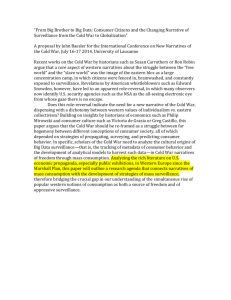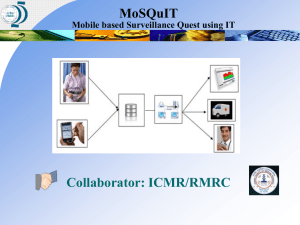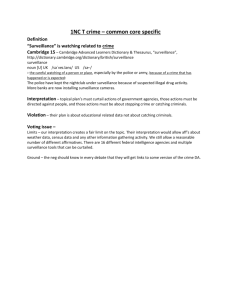D2-20
advertisement
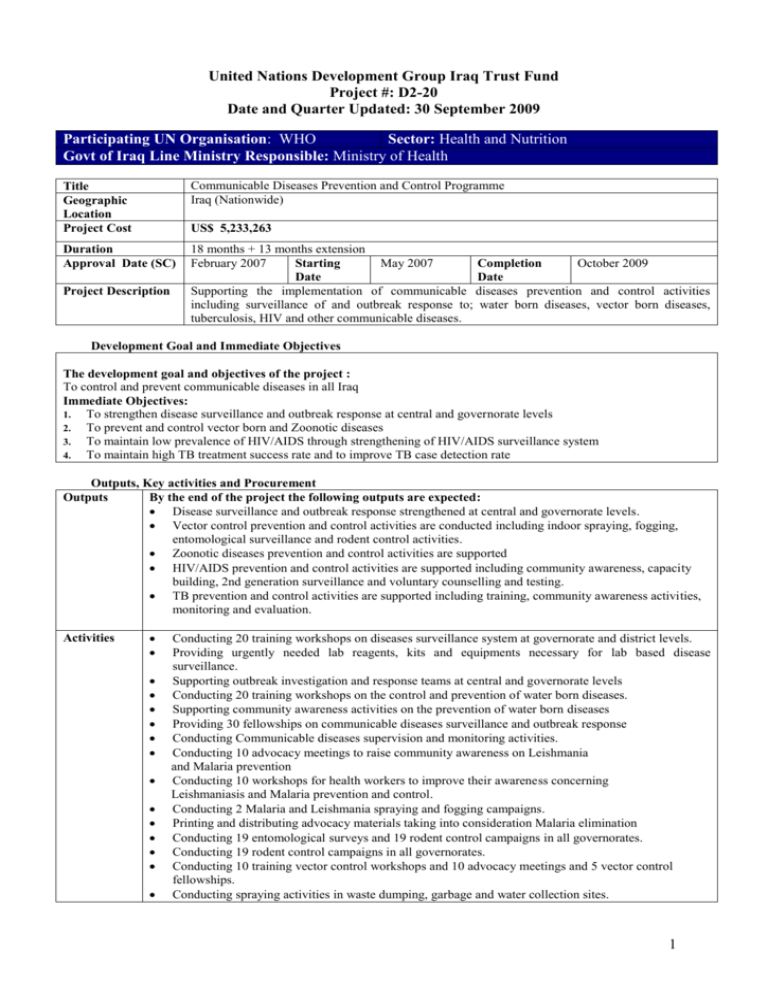
United Nations Development Group Iraq Trust Fund Project #: D2-20 Date and Quarter Updated: 30 September 2009 Participating UN Organisation: WHO Sector: Health and Nutrition Govt of Iraq Line Ministry Responsible: Ministry of Health Title Geographic Location Project Cost Communicable Diseases Prevention and Control Programme Iraq (Nationwide) Duration Approval Date (SC) 18 months + 13 months extension February 2007 May 2007 October 2009 Starting Completion Date Date Supporting the implementation of communicable diseases prevention and control activities including surveillance of and outbreak response to; water born diseases, vector born diseases, tuberculosis, HIV and other communicable diseases. US$ 5,233,263 Project Description Development Goal and Immediate Objectives The development goal and objectives of the project : To control and prevent communicable diseases in all Iraq Immediate Objectives: 1. To strengthen disease surveillance and outbreak response at central and governorate levels 2. To prevent and control vector born and Zoonotic diseases 3. To maintain low prevalence of HIV/AIDS through strengthening of HIV/AIDS surveillance system 4. To maintain high TB treatment success rate and to improve TB case detection rate Outputs, Key activities and Procurement Outputs By the end of the project the following outputs are expected: Disease surveillance and outbreak response strengthened at central and governorate levels. Vector control prevention and control activities are conducted including indoor spraying, fogging, entomological surveillance and rodent control activities. Zoonotic diseases prevention and control activities are supported HIV/AIDS prevention and control activities are supported including community awareness, capacity building, 2nd generation surveillance and voluntary counselling and testing. TB prevention and control activities are supported including training, community awareness activities, monitoring and evaluation. Activities Conducting 20 training workshops on diseases surveillance system at governorate and district levels. Providing urgently needed lab reagents, kits and equipments necessary for lab based disease surveillance. Supporting outbreak investigation and response teams at central and governorate levels Conducting 20 training workshops on the control and prevention of water born diseases. Supporting community awareness activities on the prevention of water born diseases Providing 30 fellowships on communicable diseases surveillance and outbreak response Conducting Communicable diseases supervision and monitoring activities. Conducting 10 advocacy meetings to raise community awareness on Leishmania and Malaria prevention Conducting 10 workshops for health workers to improve their awareness concerning Leishmaniasis and Malaria prevention and control. Conducting 2 Malaria and Leishmania spraying and fogging campaigns. Printing and distributing advocacy materials taking into consideration Malaria elimination Conducting 19 entomological surveys and 19 rodent control campaigns in all governorates. Conducting 19 rodent control campaigns in all governorates. Conducting 10 training vector control workshops and 10 advocacy meetings and 5 vector control fellowships. Conducting spraying activities in waste dumping, garbage and water collection sites. 1 Monitoring of insecticide resistance through providing the necessary kits. Providing 5 fellowships on Schistosomiasis control and prevention Conducting 10 advocacy meetings to raise community awareness concerning Schistosomiasis prevention. Conducting 10 workshops for health workers to improve their awareness concerning Schistosomiasis prevention and control and conducting a Schistosomiasis research. Conducting Snail (Vector control) spraying campaigns Conducting a joint epidemiological survey on Brucellosis in Iraq Providing 4 fellowships on epidemiology, prevention and control of Rabies and Brucellosis Conducting 20 HIV/AIDS workshops on HIV/AID surveillance including 2 nd generation surveillance. Evaluating and monitoring of HIV/AIDS surveillance activities. Initiating HIV/AIDS voluntary and counselling units .Providing 10 HIV/AIDS fellowships on HIV/AIDS surveillance including 2 nd generation surveillance. Providing diagnostic kits and Anti Retroviral (ARV) drugs. Support TB activities Procurement -Procurement of lab reagents and medical supplies needed to improve lab based surveillance. -Procurement of H1N1 diagnostic kits , virus transport media and Anti Viral treatment (major - Procurement of Leishmaniais diagnostic kits and treatment items) - Procurement of communication supplies to support the Field Epidemiology Training Program and the implementation of International Health Regulations 2005 - Procurement of Cholera kits and water purification tablets -Anti Malaria Drugs for 2007, 2008 and 2009 - Anti Retroviral Drugs to treat HIV/AIDS - Procurement of Hemorrhagic Fever kits Situation as of 30/09/2009 Funds Committed US$ 5,120,950 % of approved 98% Funds Disbursed US$ 4,448,273 % of approved 85% Forecast final date October 2009 Delay (months) NA Direct Beneficiaries Men Women Children IDPs Others Indirect beneficiaries Employment generation (men/women) Number of Beneficiaries % of planned (current status) -The direct beneficiaries are all Iraqis who have been protected against many 100% dangerous communicable diseases mainly the children who are the most vulnerable. -Health workers who have been trained on how to conduct the spraying, fogging activities, rodent control campaigns, etc. -More than 2000 professionals and the health workers who have been updated on the preventive and control measures of the diseases. -The community including the Community leaders, religious leaders, teachers, etc. who have been updated on the preventive and control measures through the advocacy meetings. Job opportunities were created to the community through employing of workers, field supervisors and the teams to conduct the activities in different locations, Quantitative achievements against objectives and results Procurem Procurement of lab reagents and medical supplies needed to improve lab based ent of surveillance has been completed by the regional office and all items have been delivered medical to Baghdad. Supplies Virus transport media, H1N1 diagnostic kits and Anti Viral treatment have been and procured equipment Communication supplies have been procured Leishmania diagnostic kits and treatment have been procured 5 millions water purification tablets have been procured for the Cholera outbreak 10 Cholera kits have been procure during the outbreak (112,000 US$) WHO has procured Ant Malaria drugs and Ant RetroViral Drugs to treat HIV/AIDS Procurement of Hemorrhagic Fever kits have been completed and the items have been delivered to Baghdad. 100% 100% % of planned 2 95% Training activities 97% % of 22 epidemiology fellowships have been provided planned 14 fellowships on Viral Hepatitis prevention and control have been provided in Egypt. Three Iraqis are being supported to get masters degree in Epidemiology In 2009, many missions have been conducted to Baghdad by WHO International staff to update the pandemic Influenza plans and to assess the core capacities needed for the implementation of International Health Regulations. Till September 2009, tens of workshops have been supported in different areas including vector control, Viral Hepatitis, Malaria, water born diseases, communicable diseases surveillance, Schistosomiasis, HIV/AIDS, Anthrax and Pandemic Influenza All preparations have been done to conduct H1N1 communication workshop in Erbil WHO has participated in the United and Healthy Medical Conference (22 March 2008) and Sixth Scientific Conference of Salah al-Din (23-24 March 2008) Numerous missions have been conducted by WHO International staff during the Cholera outbreaks reported in 2007 and 2008 A short course on Surveillance and Outbreak Investigations has been conducted in Baghdad from 29th April to 7 May 2008. The aim was to enhance the capacity of participants to conduct public health surveillance and respond to outbreaks of diseases in Iraq. A short course on Surveillance and Outbreak Investigations has been conducted in Erbil from 15th to 25th November 2008. The aim was to enhance the capacity of participants to conduct public health surveillance and respond to outbreaks of diseases in Iraq. Fellowships on prevention and control of Brucellosis, Rabies, Schistosomiasis and 5 vector control fellowships have been provided Ministry of Health in Iraq and the World Health Organization Iraq have organized a Meeting on the Assessment of Core Capacities and Plans of Actions Needed for the Implementation of International Health Regulations 2005, the meeting was conducted between 8-12 March 2009 in Amman / Jordan. About 45 Iraqi officials have participated in the meeting from different ministries including Ministry of Health, Ministry of Higher Education, Ministry of Transportation, Ministry of Interior, Ministry of Environment, Ministry of Trade, Ministry of Agriculture, Ministry of Foreign Affairs, Ministry of Defence in addition to representatives from Iraqi and Kurdistan Parliament. Another meeting was conducted in Baghdad between 26-28 April with full expert facilitation and logistic support from WHO. Contracts 96% % of Full technical and logistic support was provided for two Malaria and Leishmania planned spraying campaigns conducted in May and September 2007 2008 first and second Round Malaria and Leishmania spraying campaigns have been conducted successfully WHO has supported the first and second round of Leishmania and Malaria for 2009 WHO has supported multiple communicable diseases prevention and control activities: o spraying campaigns to prevent Schistosomiasis o Spraying campaigns in water collection and damping sites 19 rodent control campaigns o 19 entomological surveillance campaigns o Malaria active detection surveys o Communicable diseases monitoring and Evaluation activities The implementation of Schistosomiasis survey has been completed and the final report has been developed. The implementation of Brucellosis Survey is going on Qualitative achievements against objectives and results 2008 data indicates that there is a decrease in the incidence of many communicable diseases. 6 cases of Malaria have been reported during 2008 and only one case during the first 8 months of 2009. The achievements in Malaria is due to the comprehensive package of prevention and control activities conducted during the previous years by Ministry of Health with full technical and logistic support from WHO on number of activities, including early diagnosis and response, indoor spraying, fogging, entomological surveillance activities and rodent control activities. Main implementation constrains & challenges (2-3 sentences) - Security remains one of the challenges to program implementation in Iraq Humanitarian and development activities are going on at the same time. WHO is providing support for the humanitarian activities while providing technical advice for the development of health strategies and policies. 3
